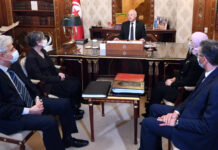Opponents of Kais Saied, most of whom are from the parties that have ruled during the past ten years, are trying to pressure him to make his actions circumstantial and to preserve the 2014 constitution and the institutions that this constitution establishes, including Parliament.
This opposition mobilizes for a major demonstration today, Sunday, in the main street in the Tunisian capital. Regardless of its success in gathering large numbers or not, the problem for opponents of Kais Saied’s recent measures is their credibility in the Tunisian street.
Whatever the legality of the objection to the detailed code issued in the Official Gazette that enables the president to accumulate wide powers in his hand, the opponents cannot embarrass him for a simple reason, which is that the majority of Tunisian citizens view the political class that ruled in the last decade, and their opponents, as having squandered their opportunity to change, and that people can no longer give them a new opportunity to repeat the old image, the image of the daily fight and shouting in Parliament and satellite channels.
This political class did not leave the people an opportunity to defend it through the widespread chaos in the country, the spread of corruption and nepotism, and the treatment of the state with the logic of booty.
People want a radical change, and they see in Kais Saied the hope of implementing what they want, and the differences over the interpretation of the chapters do not concern them, and they do not see democracy itself as a goal as long as it represented the cover of the lobbies, and showed the limitations of the parties’ programs, and the opportunism of many party leaders and independent political figures.
What hinders the opposition protests mainly is the image of the past decade in the eyes of the people. While Kais Saied receives a huge percentage of sympathy, the popularity of his opponents dwindles, starting with Rached Ghannouchi, head of the Ennahda Movement, and the frozen parliament speaker. Ghannouchi is living in a difficult situation within Ennahda, after the resignation of more than a hundred leaders of various ranks, hours before the September 26 march, during which he wanted to show Ennahda’s strength and strength personally.
The same is true for the rest of the parties that have witnessed resignations and withdrawals, especially the Democratic Current – the third-ranked party in the weight of parliamentary blocs – which is trying to differentiate between its support for Chapter 80 and Kais Saied’s recent interpretations that empowered him with legislative and executive powers.
Likewise, the Heart of Tunisia party has almost disappeared from confrontation after the arrest of its leader, Nabil Karoui, in Algeria, along with his brother, who is a member of parliament for the party. This is what prompted deputies from Qalb Tounes to resign from it and put themselves at the disposal of Kais Saied if he wanted to dissolve parliament according to any legal conclusion.
It is clear that Sunday’s demonstration is an attempt to cover up the crises experienced by the parties and their declining popularity.
Also, the various groups that adopted the demonstration and criticize Kais Saied do not accept any alliance with the Ennahda movement, and most of the statements issued in its name began with a preamble saying that Ennahda was responsible for what happened and that it led President Saied to announce his actions.
Thus, the opposition front that stands against Kais Saied is a circumstantial front that may directly benefit from international diplomatic and media attention to Tunisia’s developments, no more.
There is no doubt that Kais Saied’s adherence to his options will divide this opposition into oppositions, some of which are pragmatic and will extend their hand to the new authority in search of a position, and others will choose to retreat from the spotlight, and be satisfied with recording positions from time to time, and the third, such as Ennahda and the Labours’ Party, will repeat the experience of the classic opposition.
Adapted from Al-Arab Newspaper











